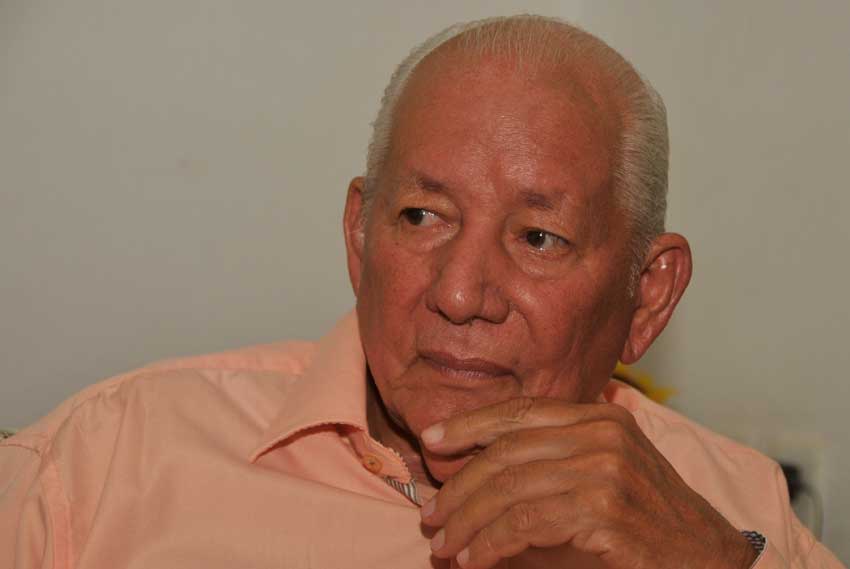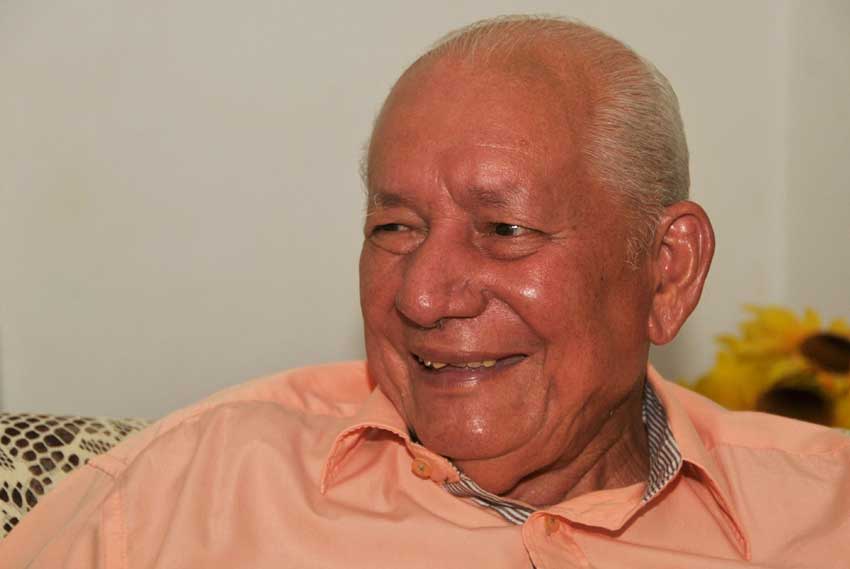
Cuba marks today's 60th anniversary of international medical collaboration. 26 Newspaper reveres the date and so much good work with the story of a very singular doctor.
The day he set foot in the sacred jungle, back in the twists and turns of Guinea-Bissau, the most unknown smells embraced his skin as if in a surreal trance from which he could not wake up. He had arrived there to negotiate with a sorcerer the fate of several patients, and the weight of his 33 years was impregnated with the opportunity, to such an extent, that it still transcends him in some corner of his memory.
He walked, not without some caution. The ceremony welcomed him with a singular retinue, the cultural attaché of the Cuban embassy, a couple of anonymous and armed protectors, and another doctor like him, with flooded eyes. The yambacos (spiritual leaders or witch doctors) took hold of a kid that succumbed to the heterogeneous and undaunted crowd. With his hands, he separated the entrails, subjected them to the fire, and made pieces that fed each one of those present, like a consecrated host.
The smell of roasted meat, the prayers, the lacerating smoke, and the "exotic" banquet, a sort of ceremony to cast out the evil from the bodies and give way to the good, was a preamble to the conversation that would later mark the lives of many in the community.
Emilio Alfonso Lastre Arrieta then spoke. Sometime before, he had learned that patients with psychiatric conditions in the vicinity took their grief to the witch doctor. If the witch doctor decided, employing a ceremony, that their solution did not fit in this world, then they would go into the jungle and be hanged.
The psychiatrist told himself that he could not afford even one deader person. With this weight on his shoulders, he spoke with the yambacos. He proposed to intercede for the "marked men" as an alternative before the final trip and obtained permission. From then on, the suicide rate decreased and the stories multiplied in the first psychiatrist's office that saw that nook and cranny.
DOCTOR FIRST, TO HELP...
Lastre was then a budding physician. He arrived in the heart of West Africa with the simplicity of slipping through the cracks of an ancestral culture, which had established as divine the strength of its leader. He had to immerse himself in this knowledge to be able to face his responsibility as the only psychiatrist in an environment that made mental disorders invisible.
"I liked the years in Guinea very much. The climate was very similar to that of Cuba and the people had a special, pleasant charisma. There I did everything I could and even more. It was a fruitful period that I kept with a different kind of affection, also protected by my youth. I had 80 inpatient beds and practically lived in the hospital."
"I had no colleague to lean on. I was the only psychiatrist and more than a relief, that was a gigantic responsibility. In that piece of the world, I learned about the vitality of medical collaboration, the desire to help, the emotion, the weight of distance, and how lonely one feels... The strength of missing one's family touched me later."
"In that environment, the researcher in me was awakened. I remember that on my return to Cuba, I published a complete compendium of articles linking psychiatry with sociocultural factors."
"I came back more motivated, committed. You never come back the same. You bring back an accumulation of stories that make you greater as a human being and challenge you as a professional."
The physician recalls that at a National Psychiatry Congress, he shared his experiences and even gave a respected colleague a gri-gri (copper pulse made by the natives of Guinea) to safeguard his protectors.
ETHIOPIA KNOCKED ON HIS DOOR
In 2003 a new possibility of collaboration abroad made the physician rethink his routines. This time the weight of his three sons and his wife and colleague Carmita pierced the left side of his chest, but he went there with the same concerns.
"The second mission was different, I felt it was tighter. I was asked to be a teacher and all the lessons were in English, a challenge that changed many of the nuances that I wanted to transmit. That's where I reformed myself as a teacher."
"I felt very much what I left behind in Cuba. From the outside, people don't notice that, but it's considerable. Cubans are very affectionate and must rub shoulders with the people they love. Ethiopians are jealous to give their friendship, and very cold and distant. The two years in that geography I felt the weight of being alone. I took advantage of the time to polish myself as a teacher, but the restlessness of attending to patients was always stronger."
"I became a doctor because my father had that dream, but I embraced the profession to help people. Psychiatry came later, almost on its own. The guys in the classroom used to say that I was the psychiatrist of the group, perhaps because I was always given to listening to others, to trying to reason, to listen."
"On missions, the psychiatrist also has to look after the mental well-being of his group of colleagues. More than one has returned damaged from those trances, and it is up to him to diagnose, support, and achieve effective therapy."
TIMOR LESTE, VENEZUELA, LIFE...
The physician who today is a second-degree specialist in Psychiatry, consulting professor, researcher, and master in Satisfactory Longevity, lists in his memoirs four missions of medical collaboration, each one fruitful, heartfelt, and with plausible results of work, most of the time as a trainer of physicians, a responsibility as big as his back.
The airs of Timor also suddenly come back to him as a pleasant place that smiles at the stranger and cries out for medical help, especially when the ailments are of the brain, the least studied of the organs.
"The trips out of Cuba keep crucial moments of my life. They were the scene of many medical conferences, publications, and research, but also stand out the times I went by helicopter to visit patients in a distant prison, in the confines of an island; or the occasion when I came across a snake three steps (it bites and in three steps you die) and I came out unharmed. Alternatively, the first medal I received for being mobilized in a social uprising in Africa, so far from home."
"I am grateful for the arsenal of stories that I share now at night, with my wife when I am not sleepy.
He says that Venezuela was something else for him, he arrived there with Carmita and the fact of leaving with her changed everything. It was complete. They had their stumbles there, bad encounters and material losses, but a couple of psychiatrists joined forces and were participants in the first graduation of Venezuelan doctors."
"We had the responsibility of training newly graduated Cuban doctors as teachers. It was not easy, but it was worth it. At the same time, we enjoyed the country, the hustle and bustle of its people, and the culture of the plains state of Apure."
"Around that time, a very dear article was born, which has not yet been published, about the most frequent disorders suffered by collaborating physicians outside Cuba. It is a deep study that emphasizes causes and treatments. It was born out of our concern for our colleagues and I hope that at some point it will see the light of day and serve as a guide, modestly."
BEHIND THE WHITE COAT

In the tranquility of his home, speaking slowly and respectfully, dressed with the elegance that has always accompanied him, the psychiatrist still has the impulse to investigate and put faces to the phenomena, especially if they involve addictions, a branch in which he specialized. Although his legs no longer have the same strength as before, his intellectual ardors continue to beat...
On the wall of his house rests the most recent Annual Health Award, one of three he holds for delving into social processes. Some still remember him as director of the Mental Health Clinic, located in the town, a venture in which his wife Carmita followed him side by side and the struggle was simple: to make visible the affections of the mind with the importance of those who want a healthy society.
Lastre speaks of his patients as the kind of priest who cannot relate to what he heard in the confessional. From his knowledge of drunk students that become notorious, like him, in Las Tunas' panorama, he highlights Senén and Gervacio. He has a clean dialogue, focused on the need to sanitize the mind in these convulsive times, to take care of sanity. To validate the family and create emotional bridges that protect them from the harshness of everyday life.
He remembers his father with palpable adoration. He comments that if he had not been a doctor, he would have been a chauffeur, like him. But his eyes sparkle when he lies to Luisito, his youngest offspring, that when he straightened his steps towards Psychiatry, it stirred his chest with pride, perhaps similar to that which he nested in his parents. He speaks of the past, but also in the present tense. Seven decades embrace him, but Lastre continues to delve into the afflictions of the mind, always with the insistence to help. That is his path.





